Text of my keynote at The UX in Libraries conferences in Sheffield, June 6 2018 [get to your fave armchair, it’s fairly long]
I was travelling to Sheffield yesterday and before leaving for the airport I was going over the news and read a story about an allotment which were going to vote about if you should be able to talk and write Danish to be allowed to live in the allotment. [I might have cursed at this point, sorry about that]. I got so angry and so sad when I read that. I’m used to politicians talking crap about closing boarders, sending refugees home deciding how much pig meat should be served in schools but this was normal and regular people in an allotment voting about excluding people who could not speak or write Danish from there garden community. And I thought to myself that these days in Sheffield, talking inclusion and inclusive UX, and the way many libraries take on responsibility as forces of social good, putting an effort into social justice issues, where even more important than I might have realized. I’m a fairly positive spirit but looking at the big picture our world is not in such a good place; We are building walls, physical ones and mental ones, we are closing our boarders, we are creating societies of great inequality and we don’t invite people who don’t look like us to dance. And I believe that libraries, public and academics, are important and crucial institutions in creating a more equal and inclusive world. And I think we should take that responsibility upon us and I like to talk with you about that today.
So even though this obvious is a conference on UX in libraries I am not gonna talk about UX today except that I guess that you could say that everything we do as libraries will – or at least should – end up with some kind of user experience. Looking at the program we are gonna get a lot of awesome UX insights for the next coming days and when I get invited to do a talk I like to try to figure out what I could bring to the program that people might not get from each other or from some other speaker. So I’m gonna face the theme of inclusion which is framing this years conference. It’s a subject that I find utterly important on many levels and to which I have strong feelings both as a private person and as a library professional. I will be talking about the importance of creating inclusive communities where we feel that we belong, the obstacles we face trying to do so and why libraries can and should be leaders in promoting inclusion. I hope that is cool with you.
Let’s talk a little bit about inclusion in general. How many in this room thinks that inclusion in general is a good and positive thing? Raise your hand if you think that. [100% raised a hand]. We often think that in libraries which is nice because it really is the right thing to do. But I also think it is important to look beyond that fact and actually see at what comes with creating inclusive environments and the consequences of exclusion.
Do anyone believe that some humans are born evil? [nobody raised there hand] I find that question relevant working with inclusion because if the answer is no, that nobody are by default born evil, there is still great hope for us. I’ll get back to that.
Where do you put your money in the socks? Inclusion and hidden biases
A story. As a young man I lived in a ghetto in Aarhus, Denmark called Gelleupparken. It was not Harlem or anything but the population rate of citizens with middle eastern origins was way higher than in the rest of Aarhus. I worked in a bar, downtown Aarhus at that time. Every month I got an envelope with tips. We were getting tips by how many hours we had worked and I was working a lot of hours so it was a pretty huge envelope. Enough to pay my monthly rent. Which was cheap because I lived in a ghetto. So on the day when I got my envelope with tips I would take the bus to Gellerupparken, I would get of the bus and then take the money out of the envelope and put them down my socks so if I was assaulted and robbed on the way to my apartment there was a chance they would not find my tips. Some could say that it was common sense. But you could also say it was very wrong. I think the important question is why did I do it? Have I experienced anything that made me do it, had I been robbed in Gelleupparken before, felt hostility and feeling insecure? No, not at all. Did I do it downtown Aarhus with a lot of white folks around me? No. My stereotypes and prejudices towards people from the Middle East, my to some part unconscious fear of strangers, non-white strangers that is, got me to put my tips in the socks while I walked through my own neighborhood. I never experienced anything but friendliness and openness from the middle east society in my neighborhood for the 2 and half years I lived there. Today I believe that the money-in-the-socks action is the sum of the social structures, our way of writing history, the stories and images the media tells and that we reproduce every day and that gave me the idea that my own neighborhood was not a safe place.
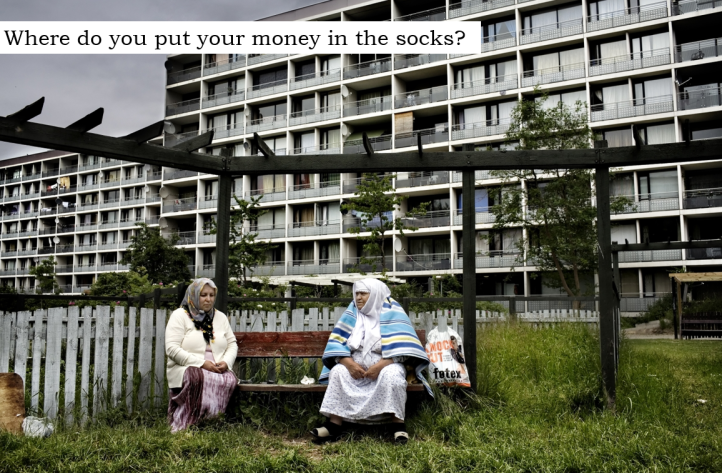
Today I feel ashamed that I hide my money in my socks. I also feel worried and to some part scared because it’s the same stereotypes and prejudices towards minorities that are floating through the veins of our communities like a cancer that drives people to beat black folks up, that makes white guys give jobs to other white guys instead of women, to say that gay couples can’t be married, that won’t acknowledge non-binary and transgender people and that sends refugees home to countries of war and terror.
That was 20 years ago. I was a young kid easily effected by my surroundings and didn’t reflect on my actions. Today I grown wiser you should think? I do believe that my ground values corresponds highly with an inclusive approach towards everybody around me no matter skin color, sexuality, educational level, economic status, if they are physical or mental disable and so on. And I’m trying to live that out as a citizens and as a library professional. I like to dance with everybody. But, as I guess many of you know, sometimes there is a difference between our self-perception and how we actually feel and the actually activities we carry out. We all have blind spots.
So I’ve been testing myself on preferences and hidden biases. I’ve been testing myself on preference towards race and this is what I got:

Test yourself with the Implicit Association Test from Project Implicit: https://implicit.harvard.edu/implicit/
According to the test I have a moderate automatic preference for European Americans over African Americans. Meaning that I prefer white people over people of color. White people are my default. I took the test with Project Implicit which is based at Harvard University and is a non-profit organization and international collaboration between researchers who are interested in implicit social cognition. The goal of the project is to educate the public about hidden biases and to collect data on the subject. Data is collected when people across the world test themselves.
It was a bit of an eyeopener for me and it tells me that the big fight for inclusion is not a fight against evil. Inclusion is god damn hard work because we all carry our blind spots and have our defaults. I don’t believe we are born evil but I do believe that our historical legacy and the social structures we have created effects us massively to include some people and groups and to exclude others. Very often on an unconscious level. And that will be the first take-away from this talk; Everybody in this room raised the hand in favor of inclusion but the work towards creating inclusive communities is not solved with being a good person with sounds values; We are creating inclusion by casting light on blind spots, advocating, opening people’s eyes, giving them tools to work with hidden biases, trying to understand the structures we are living in, put things into action and really start to dance with people who don’t look like ourself.
I do believe that inclusive communities is crucial for creating a better world but what I think these two stories show is that is it not enough to believe, inclusion demands action, awareness, responsibility.
Being a white dude: Something about majority and privilege and blind spots
Before I move on you need to know something about me. From my name you might guess that I’m male and as you might guess from my job title I hold some sought of formal power when I go to work. What you might not see is that I’m also heterosexual. I’m well educated. I come from a middle class family. I’m not physical and mentally disabled. I’m married to a white well educated woman that also comes from a middle class family. We have two white kids that goes to public schools. We live in a welfare state: healthcare and education are free. I have never been persecuted because of the color of my skin, my sexuality, my religion or for what I believe in and stood up for. Nobody ever hated me. I belong to a majority. I’m privileged. One could fairly ask: Is this white dude the right one to stand here today and talk about ‘Inclusion’, diversity, social justice? One could also argue that I am not due to my background which I just listed – how on earth could I talk about inclusion when I never really felt the consequences of exclusion on my own body? When I’m born belonging to a majority and privileged in almost any aspect of life? Maybe Malala Yousafzai who was shoot in the head at age 12 by the Taliban for advocating female education in Pakistan be a better fit? (she survived and is still advocating female education). Or my global library friend Annie Pho who tweeted this after visiting Vietnam. I think what Anna writes is very strong and powerful because it shows what millions of people are dealing with everyday.

I don’t know how that feels. So yes, there are better choices than me to talk about inclusion and maybe you should have asked somebody else or I should have left this spot to someone else. But I also think it is important not to disqualify my white privileged voice in the discussion and debate on inclusion and social justice. White men like me talking about inclusion is a very different voice than the one from Malala and Annie, we should be clear about that, but I believe that it is the sum of voices debating and advocating inclusion, diversity and social justice that does the impact and there is a great chance that other white guys will not listen to people like Annie and Malala because we tend to only listen to our defaults – and their default is me because I’m male and white like them. The really really important thing here is that when you are someone like me, a white majority, that you try really hard to acknowledge your privilege as a white man and the biases that follows.
Also I am not an expert on diversity, inclusion and social justice, I haven’t done sociological studies in this field. But I do feel very strongly about it both as a person and as a library professional so that is what you gonna get.
What do we talk about when we talk about inclusion?
As we already found everybody in this room basically thinks that inclusion is a good thing. But do we all talk about the same kind of inclusion? Do we understand the concept of inclusion the same way? Inclusion is a heavy subject, comes with a lot of ethics and values and I find it important that we understand what we talk about when we talk about diversity, inclusions, exclusion, belonging, social justice and communities. And I, at least for my part, feel obligated to tell you what I’m talking about when I talk about inclusion so here is a super short overview of what I talk about when I talk about inclusion and exclusion.
First of all I don’t think you can talk about inclusion without talking about exclusion. And both comes in so many forms and are deeply rooted in the history of humankind; The Great Wall of China, The Berlin Wall, The fence between US and Mexico. All material manifestations of our need to manage inclusion and exclusion. It is deeply rooted in our history and social structures and the spectrum is large: Race, sexuality, religion, gender, disabilities, political believes or just because you are different in some way.
And we include and exclude all the time on so many levels. Anybody knows what this sign says?
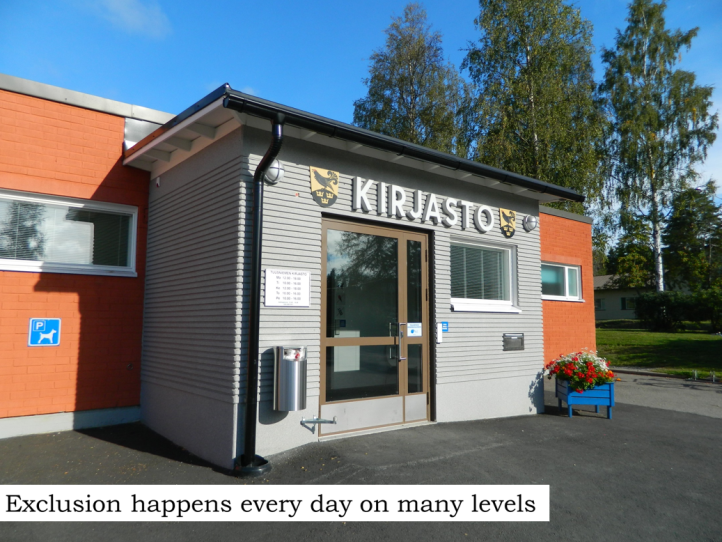
It says ‘Library’ in Finnish. So if you can’t understand Finnish you are basically excluded from that explaining and the welcoming that I’m guessing was the intention by this sign. I’m using this example because opposite the walls and the fences, which are all conscious acts with the purpose of excluding certain groups of people, I’m guessing that this is not a matter of intentional exclusion of non-finnish-speaking users of the library. I’m pretty sure that there hasn’t been a meeting where somebody said something like “We should only signage in Finnish coz we only want people who can understand Finnish in the library”. On everyday basis acts of exclusion is carried out due to unconscious actions or non-actions – sometimes based on biases and sometimes just because we do not really use our heads.
So inclusion goes hand in hand with exclusion. For inclusion I like this definition:
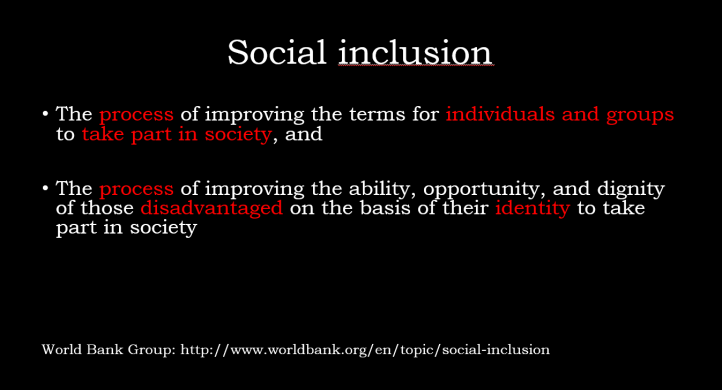 What it says is that ‘Inclusion’ is a process, Inclusion demands actions. Inclusion doesn’t just come by itself, we need to open our arms and ask people to dance to create inclusion. The definition also points out that inclusion can be targeted towards both individuals and groups and inclusion is about making them a part of society. The definition also states that we are not born equal. In so many ways men and women are not equal, white and colored people, heterosexual and LGBTQ’s . The acts of inclusion are aiming at improving the conditions for those who a disadvantaged by our social and historical structures.
What it says is that ‘Inclusion’ is a process, Inclusion demands actions. Inclusion doesn’t just come by itself, we need to open our arms and ask people to dance to create inclusion. The definition also points out that inclusion can be targeted towards both individuals and groups and inclusion is about making them a part of society. The definition also states that we are not born equal. In so many ways men and women are not equal, white and colored people, heterosexual and LGBTQ’s . The acts of inclusion are aiming at improving the conditions for those who a disadvantaged by our social and historical structures.
Also: This is the library DNA to me. It correspond so well with what I believe are the values of libraries and librarians: Support and promotion of democracy, enlightenment, diversity, inclusion, openness and intellectual freedom. Really, if you can’t read ‘library’ in to this definition of inclusion you might be in the wrong business.
Diversity is being invited to a party. Inclusion is being asked to dance
One note on inclusion and diversity: Inclusion is often used in the same sentence as diversity and those two are closely related but are not the same. I like Verna Myers way to treat how they are different. You can have a recruitment strategy at your library that aims at employing more people from differing background to foster diversity in the workforce but never fool yourself that it will cut it and create an inclusive workspace and a more inclusive library. Diversity is not a goal in itself until we have discovered that unless the environment, the friendship, the neighborhood, and the workplace are inviting, fair, and respectful, diversity is not going to make a difference. Hiring women and people of color into organizations historically dominated by white men without proactively making those organizations more inclusive will ultimately backfire. In such cases, new recruits will need to assimilate into cultures that are not designed to support them. This mismatch in culture can lead to burnout, attrition, and lowered creativity, innovation, and productivity. Without properly focusing on the inclusion aspect of diversity and inclusion. It takes two to tango and the surroundings really needs to be willing to dance, to invite people to dance to foster real inclusion. Otherwise, it will just be a party with different groups hanging out in the corners. In order to create a better world we need to make the people in our communities dance together and as I will point out, libraries holds both a significant role in doing so.
Why do we care about inclusion?
So, why do we even care about inclusion? Why is it a theme on this conference? Why it important to talk about? To act on? Because the act of the inclusion is also a fight against exclusion and exclusion is bad news – both for individuals, groups and society. And I think it is OK to say that inclusion is really the right thing to do and have values that corresponds with inclusion and to be against exclusion but I have been reading a bit of research on inclusion and it really is a good thing; Inclusion makes you thrive mentally and physically, gives us the opportunity to learn from others and to help others and it can help us feel that we belong. I recommend the works of Leary, Baumeister and Twinge for further readings.
I find the concept of belonging very important and very closely related to inclusion. I see belongingness as a fundamental emotional need for human beings to be an accepted member of a group: Could be a family, co-workers, religion, a football team or the UXlibs community. If you tell me you don’t need to belong I say you either a psychopath or a liar. We have a desire to belong and be a significant part of something that is greater than ourselves.
Some of you probably know Maslow’s Hierachy of Needs; Human beings have some basic needs like food. water, rest etc. If we don’t get them we die. We also need to feel safe and secure in order to function. And then we have some psychological needs: We need to belong and we need to feel loved. We need friends, and lovers, we need to care for others and we need to fell that others care for us. Think about your own life, think about what makes it worth living. For me it is often the desire and need to belong. To belong to my family, my kids, my wife, my football team, my library community. It is everything for most of us and inclusion is the engine that gets us there.
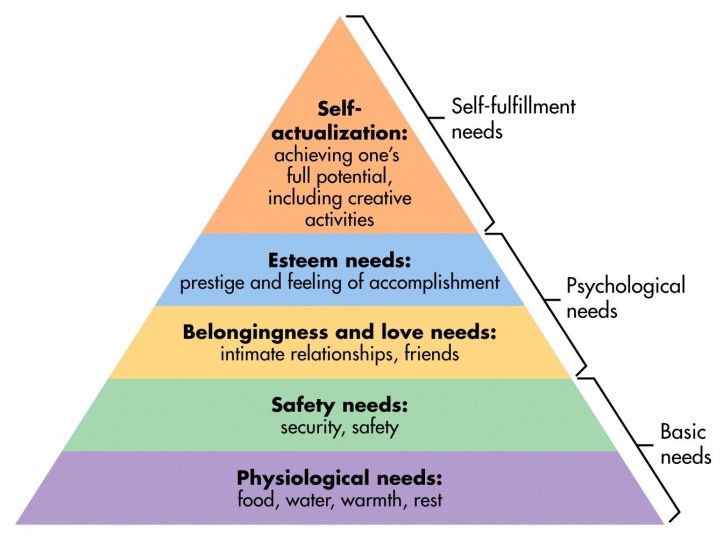 Maslow’s hierachy of needs (1943)
Maslow’s hierachy of needs (1943)
A question I find very interesting from our own library world is why students come to the library only to work. To study at a reading room or book a group room to meet with there peers. Why don’t they sit at home? Are the chairs and tables that much better at the library? What kind of user experience do we create that they can’t get at home. Or on another place on campus? For many students the study is a huge part of their life and I think it’s crucial for there well being and ability to perform that they feel that they belong. Same go with researchers and teachers. Libraries has been a trustworthy brand for 5000 years and as an open space, not focused on administration or grades, I think the library can help students with the feeling of belonging with stimulating their academic identity and create and facilitate spaces where they can connect with other students (and teachers and researchers). When they sit at that reading hall, alone but together, and look around to all their fellow students, they fell a shared identity of studying and learning, they feel that they belong.
If it is the right thing to do why do we face obstacles towards inclusion?
My values correspond very strongly with inclusion so I find it hard to understand why people just don’t feel the same way. Why would you like to exclude somebody, let’s all dance and tear down the walls. But there are reasons why it’s not like that and in order to work effectfully with inclusion I find it significant to understand and acknowledge the obstacles that are hindering inclusion and belonging.
Obstacle number one: Inclusion means change and change means fear
In many cases inclusion means change. And change means fear. Things that comes from the outside means fear. And when we fear something we fight it or run from it. We rarely embrace it. Let’s take a simple example as skateboards. Do you like young kids with skateboards in your libraries? Do you welcome them with open arms? Isolated skateboarding is a really good thing; It gives you a better balance, exercise and the communities around skateboarding can give you a sense of belonging. But imagine a group of skateboarding kids suddenly starts to hang out at the library. They might not do skateboarding tricks between the stacks but they are there with all the skateboards and sometimes they might just skate from one place in the library to another and it’s creating a bit of turbulence in the library room. Suddenly we have a change from everyday library life. What if there comes more skateboarders? In Denmark we have unstaffed libraries, what if they show up at night and do skateboarding competitions? We have change. And we have fear. And when we fear something we often try to exclude it. In libraries we ban things. So a solution to the potential problem could be to ban the skateboards. But it’s actually a shame, isn’t it: This is young people in the community with a hobby. A hobby on wheels but still a good hobby. And they come to the library with there skateboards and we excluded them because we fear of the consequences of to many skateboards in the library. And what we need to think about is that we are not only banning skateboards, we a excluding a community of skateboarders. If we have a culture that could for a start try to embrace instead of fearing could we come up with a solution? Sure, this is wonderful example from Central Rappahannock Regional Library in Fredericksburg. It says “you skateboard but we can’t have skateboards in the library for pracitcal reasons but we still want you and your friends to come so dock it and lock it”. I really love this, it’s wonderful inclusive UX.
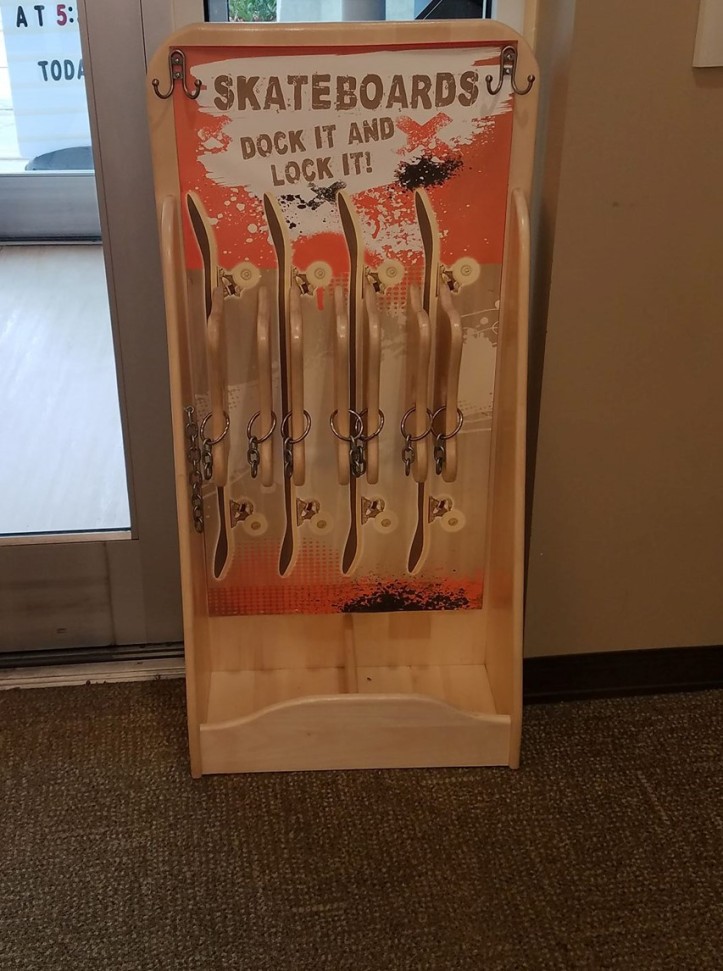
Obstacle number 2: Biases are the stories we make up about people before we know them
Obstacle number two towards inclusion I want us to be aware of, is our biases. We all got them and they highly influence out ability create inclusive environments. I’m sure we all got our money-in-the-socks moments. Biases are the stories we make up about people before we know who they really are. You know I talked about wall and fences in the beginning. Biases are the mental walls and fences and they are so much harder to knock down than the physical ones. Be honest to yourself; if your car break down and there is a man and a women comes by who would you ask for help? Also did you know how hard it was for me to find a picture of a woman fixing a car on the net? Either it was lame meme’s about women don’t knowing anything about cars or it was pictures with heavlily sexual overtones. Proving that new walls and fences are being build all the time. Facebook are creating walls and fences with their algorithms. My feed is filled with well-educated heterosexual white folks like myself voting for left-wing parties. 80 % of Wikipedia is edited by primarily white male editors from North America and Europe. 75% of the Danish population is a member of the Danish Christian Church but when a white Danish guys commits a murder the media don’t label him as Christian. When a middle-east dude commits a murder the same media label him as Muslim.
Obstacle number 3: Lack of diversity: The white profession
So the last obstacle towards inclusion lack of diversity. As I said before diversity don’t promote inclusion by default but it is an important driver. And if we look at our own business we I will put out there today is a well-known one and a sought of local library one: The lack of diversity in library workforce and LIS education.
These figures are a few years old but not much has changed. The library profession is a white profession. The bar chart are comparing the percentage of US librarians by race in 2010 with percentage of US population by race in 2013 and projected percentage of US population by race in 2060. Conclusion: The US library workforce don’t reflect the diversity of the nation. And it is the same picture in most western countries and the obvious problem is, that a uniform white library workforce is most likely not to create diverse and inclusive libraries to serve their communities because we think alike.
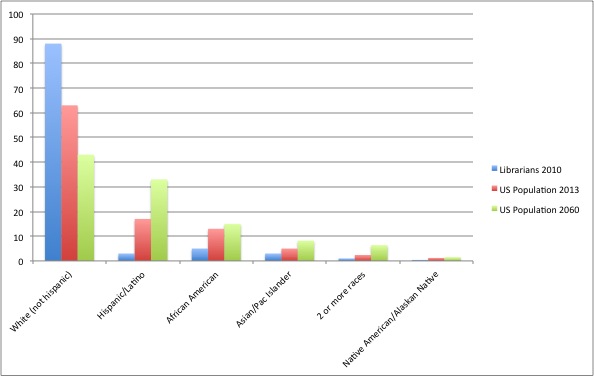
Numbers are from Chris Bourg’s excellent blog post: The unbearalbe whiteness of librarianship https://chrisbourg.wordpress.com/2014/03/03/the-unbearable-whiteness-of-librarianship/
The prize of greatness is responsibility. What libraries can do
So what can we do about that fear, biases and lack of diversity? How can we promote inclusion? I got a quote by Winston Churchill hanging in my office and it says “The prize of greatness is responsibility”. I like it coz it reminds me not just to float on but also to take responsibility. I believe libraries are forces of social good, I think libraries are great and I think libraries has the responsibility to actively work for more diverse, inclusive and empowered communities. Because that is the right thing to do, that is the society that I like us to live in. I think libraries should actively take on a role as leaders for advancing diversity, inclusion and social justice in our communities. A responsibility to provide access to information, knowledge and data and to give our communities the tools and the skills to critical evaluate that content. A responsibility to collect, preserve and provide access to information about, by and for members of marginalized communities. The responsibility to provide open and inclusive spaces and systems.
Why libraries and librarians? Well, first, as I said earlier, I think diversity, inclusion and social justice is in the library DNA, it corresponds so well with our values. Secondly, if you are looking at an academic context the library is not a real authority, we don’t evaluate students, we don’t give grades, we focus on helping them succeed and we are interdisciplinary places which are obligated to let many voices be heard and give students and faculty the skills and tools to understand current events of exclusion and marginalization through our collections. If you are looking at a public library context were could you go in a community these days were you find an open and public space that dosen’t want your money and is not a social office?
Libraries are great institutions and we have a responsibility.
It’s easy to have values but hard to follow them
I hope by now that I have revealed that inclusion does not come by itself. Promoting and advancing inclusion needs to go beyond words. It calls for action. So lets’ look at a few examples of how libraries can carry out the responsibility as community leaders for diversity and inclusion. I grouped them in that you can do yourself, what can be done internally at the library and what can be carried out in the community.
What you can do yourself: What we say matters. What we do and don’t do matters
As individuals, we both acts in our library related communities but also in our private sphere. I don’t think social justice is a jacket you put on when you go to work at your library. It should really be a jacket your wear all the time. I don’t decide if you believe in inclusion as a good thing and if you do, I don’t decide on which level you like to carry that belief out in actions. But we all have a responsibility about these issues, anywhere, all the time. Let’s take family dinners as an example. Ever tried to sit there with all the food and the drinks and the good company an all of a sudden your uncle pulls a racist joke? Just casually over the table. People laugh and say things like “yeah yeah that is fine with you Uncle John”. Uncle John might not be an actually racist, he might be a really good person but that doesn’t justify making jokes that marks people on the color of there skin. It can be so so really hard and awkward but if we believe in inclusivity and social justice as an important issue we need to be active and take a stand in situations like that – as library professionals but also as private persons. You know who is also at that table? The kids are. They hear uncle John’s joke and the acceptance around the table. We have a responsibility to stand up. We have a responsibility to vouch for people who are members of marginalized groups both on a personal and professional level. When you hear somebody who says that women do not understand tech then tell them that it is not true. Now important point is that this is not necessary easy to do no matter who you are and it will often have the greatest impact if you are in some sought of position of power and privilege. Like white men often are; If you are a man speak up for women, if you are white speak up for colored people, if you are straight speak up for LGBTQ people.
And you know what, this is so hard. I know that because I try to be that person and I fail all the time. You know the concept of “Hygge”? That is very important to Danes and if you say over the dinner table, “Uncle John, what you just said was racist and not ok” then you will mess with hygge and that is not well seen. But maybe you don’t have to say it in the actually situation. Maybe you could start with taking Uncle John aside after dinner and say to him: “Hey, Uncle John, you know I love you and respect you but that joke back there was really not cool and I don’t like my kids to take on that kind of values, ok?”. If we try, if we all try, small steps, we are doing a good thing and will make our communities better places to be.
What you can do a the library workplace: Diversify, make inclusion a priority and focus on hidden biases
I believe that a diverse workforce in libraries are an important driver for inclusion. I belive that a diverse workforce a better capable for making good and relevant library services to a diverse community. When we recruit, I believe that it is important that we look for voices that are different from the ones we already have. In practice it can be a bit difficult though. Due to eternal budget cuts, I don’t have many opportunities to recruit and work with my staff composition but there are other ways. We do have a steady flow of student employees so when it comes to diversity in etchnical background we are working on making our workforce less white by recruiting students with different ethnic backgrounds than Danish. This is Nakisa from The Faculty Library of Social Sciences. She is from Iran. Half the student workers at my three libraries has a different background than Danish. It’s not the same as having a truly diverse library workforce but when you are pretty stuck, unable to hire, it is a great way to start. Other options are through temporary positions like internships and project positions.
What else? We don’t only hire from library schools but obvious it is a huge source for recruitment in many libraries. How is diversity looking in LIS education? No good, very white. We need the LIS education to be aware of how they promote and target the education and do curtain program to reach out to marginalized groups. Speakers and panels at LIS conferences. We have already talked about how white I am. When you put together a conference program think about the diversity of the speakers. Do you end up with a bunch of white folks I’ll suggest you change it.
Make inclusion a priority at your library. Say it out loud – we are going to work on being a more inclusive workplace and make a plan for have to deal with that. Focus on awareness and dealing of our unconscious biases. There are many great programs you can run in your libraries to help staff be aware of unconscious biases and how to work with them. The greatest services we provide as libraries are bound to the people we have working in our libraries so this is really important. and then keep in mind that culture east strategy for breakfast any day. When you implement your plan for a more inclusive workplace keep in mind the existing culture. Otherwise chances are great that you will fail.
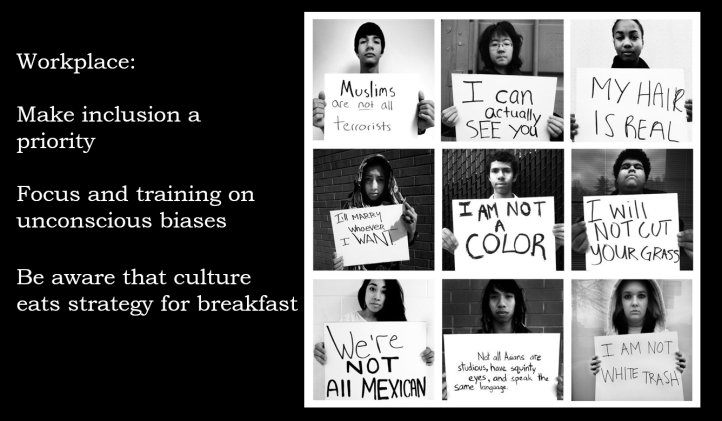
What the library can do in the community: Invite, involve other voices and empower
I was invited to come here today and talk to you. Thank you for that. Andy wrote me and that made me feel good. Now getting an invitation doesn’t necessary make you feel welcome, included or that you belong but it is a bridge towards that. Especially if the invitation is unexpected and well meant. One of the student groups that I feel are sometimes forgotten in higher education are the international students. It can be a damn hard job to be an international student. Not only are you a student (which implies loads of reading, exams, expectations and hardly no money) but you are a student in a foreign country with a different culture and have to deal with a new city, new people, new university and often a new language. I strongly believe that international students (as well as international faculty members) are important for the diversity and development in higher education and being well integrated they are bringing valuable input to campus on both studies, learning, science and culture.
But in Copenhagen and many other cities the fact is that they don’t get well integrated: they quickly make small ghettos of international students, hang out in the same bars, playing table football and leave the city and university without giving that much of the diversity that is important for higher education. Why is that? It’s hard to pinpoint one reason but if the university and academic environment is closed around itself it certainly doesn’t help.
To make sure that international students get’s better integrated The University of Copenhagen has established a mentor/mentee program were new international students (mentees) get hooked up with mentors (danish students or international students who have lived in Copenhagen for a while). The mentor/mentee partnership makes sure that the new international quickly gets established a local network which is important in both integrational, social and pracitical sense.
I think that is a brilliant idea and we wanted to support that and we came up with a simple concept: A Library Candle Light Dinner where we invite new international students and there mentors. The purpose is simply to say welcome to Copenhagen and to create a welcoming space for them to meet each other and have a good time and by that make a steppingstone for further tie up the connection between mentees and mentors – between new international students and the university and country. I always do the welcoming speech on behalf of the library and it fills me with so much pride and happiness to do that, to invite them and to say welcome, we are here for you and we want you to be a part of that. I can hear walls and fences collapse around and in most cases the dinner ends up with dancing.
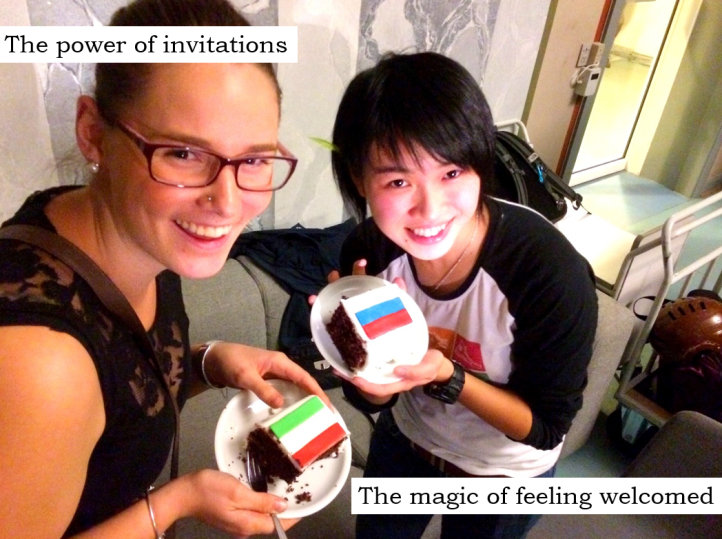 Read more about the Library Candle Light Dinners here: https://christianlauersen.net/2015/10/29/the-library-as-platform-for-integration-of-international-students/
Read more about the Library Candle Light Dinners here: https://christianlauersen.net/2015/10/29/the-library-as-platform-for-integration-of-international-students/
We are not alone caring about diversity, inclusion and social justice in communities. Look for partnerships were you can join forces in advocating and promoting diversity and inclusion. These fine young people are a student body called Inclusive Campus at Roskilde University. We have established a partnership were we set focus on diversity and inclusion with events, talks and debates. They mostly arrange, we facilitate, and the events are held in the library. We are also currently working on a reading list on resource concerning diversity and inclusion. I have also used them to discuss how we can make the library more inclusive. Two great and very important things about doing partnerships with students: They see the world differently than we do as library professionals, what we think is an inclusive act they might find insignificant. Or even exclusive. And then they just have a totally different outreach to the student population than we can ever have on our own. So we also use these partnerships as outreach to a larger body of students.
Ever heard about The Human Library? The one who hasn’t are in for a treat – this is really something. The Human Library is a non-profit organization born in Copenhagen in 2000 as a project for the Roskilde Festival. The Human Library is designed to build a positive framework for conversations that can challenge stereotypes and prejudices through dialogue. The Human Library is a place where real people are on loan to readers. A place where difficult questions are expected, appreciated and answered. They are a travelling library that organizes events all over the world where you can borrow a human being: It could be a muslim, an alcoholic, a HIV positive, a refugee or someone who has been sexual abused. This is such a beautiful concept. The founding fathers and mothers of The Human Library are not librarians but I find it interesting that they tap into the library concept with naming it The Human Library and calling the people in the program ‘books’ and the users ‘readers’.
The “books” in this library are people who have been marginalized and discriminated against in society. They have volunteered to speak about their experiences with discrimination in a one on one setting. The idea is to have an honest and positive dialogue that will help break down barriers and end prejudice.
The “Books” in The Human Library are not experts on their topic but they are experts about themselves.
Many libraries and other institutions around the world are teaming up with The Human Library to create dialogue and understand, to expand peoples mind and break down prejudices and move those unconscious biases. You should do the same.
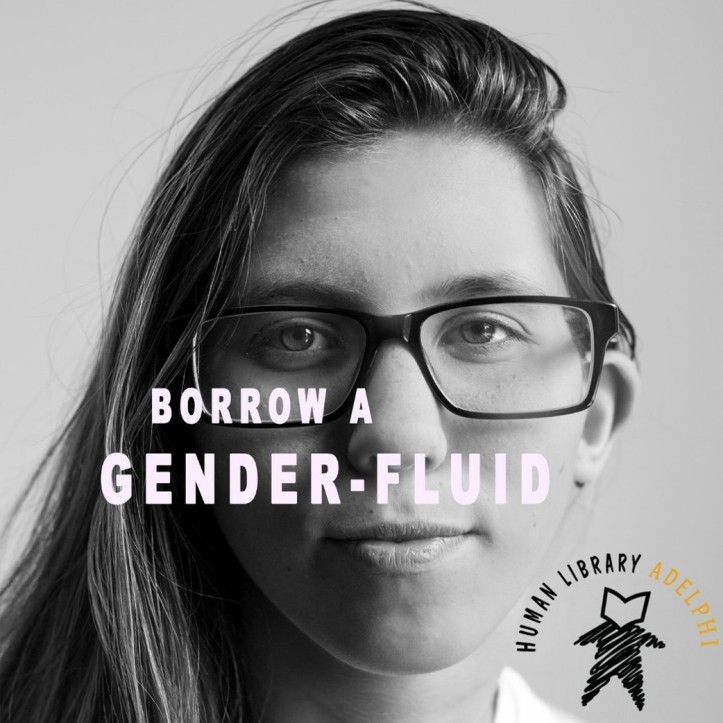
We are coming to an end of this talk. I hope that I have been able to give you a sense of why inclusion is so damn important, what we are up against when we promote diversity and inclusion and why and how libraries can take a lead in their communities to promote inclusion.
I have a final note which I think is important that we think about: I’m not a man of numbers, budgets, foot traffic, downloads and so on. It’s all a part of my job but basically I’m really just interested in the people behind the numbers. But when I’m trying to push the agenda to stakeholders that libraries are important because we make students feel like the belong, that we should have a social justice agenda and create inclusive communities I often meet the respons “that’s great but how do we measure it?”. I work in an arena where numbers are king and the things we do needs to be measured or tracked otherwise it doesn’t really exist and doesn’t matter. And I get that to some extent, it important for our stakeholders and all of us to go beyond words when we talk about the value of libraries. The problem is that a degree of inclusion is damn hard to measure. And that is one of the many reasons why I find UX so great and wonderful; UX are a mirror to understanding our users beyond the objective numbers, UX gives us tools to understand the behavior of users and non-users and it reminds us that we are dealing with actually human beings and not only a ‘students’ and ‘researchers’. In that sense UX is an extremely important factor in the continuously work on creating inclusive libraries and communities coz it gives us insights and data on what works and what doesn’t.
Thank you for listening. Hope to get the chance to dance with many of you doing this conference. [To the UXLibs crowd, thank for all the wonderful talks and feedback that followed this talk – it has been so inspiration and rewarding. You are the best]

[…] kicked off with intros from Andy and Matt and then Christian Lauersen’s great keynote “Do you want to dance? Inclusion and belonging in libraries and beyond.” I didn’t take a lot of notes (perhaps my mind was already on my workshop), so […]
LikeLike
[…] The morning of the first day involved an early start as I agreed to help out with registration. This was really good, it was fun and served as a great way to say hello to just about everyone in person and understand who was there. Despite the early start, I felt really energised by the time I went in to hear @clauersen deliver his keynote. (https://christianlauersen.net/2018/06/07/inclusion-and-belonging-in-libraries-and-beyond/) […]
LikeLike
[…] https://christianlauersen.net/2018/06/07/inclusion-and-belonging-in-libraries-and-beyond/ […]
LikeLike
[…] Do you want to dance? Inclusion and belonging in libraries and beyond: Christian Lauersen’s keynote at the UX Libraries Conference 2018 […]
LikeLike
[…] Lauersen, C. (2018). Do you want to dance? Inclusion and belonging in libraries and beyond. […]
LikeLike
[…] References: Laureson, C. (2018 June 6) Do you want to dance? Inclusion and belonging in libraries and beyond. The Library Lab. https://christianlauersen.net/2018/06/07/inclusion-and-belonging-in-libraries-and-beyond/ […]
LikeLike
[…] Laureson, C. (2018 June 6) Do you want to dance? Inclusion and belonging in libraries and beyond. The Library Lab. https://christianlauersen.net/2018/06/07/inclusion-and-belonging-in-libraries-and-beyond/ […]
LikeLike
[…] Lauersen’s (2018) free-ranging essay on belonging in libraries puts that into practice. If we are more powerful working together, […]
LikeLike
[…] Institute, to place belonging as the ultimate goal. As Christian Lauersen articulates in his keynote at The UX in Libraries conferences (2018), “Diversity is being invited to a party. Inclusion […]
LikeLike